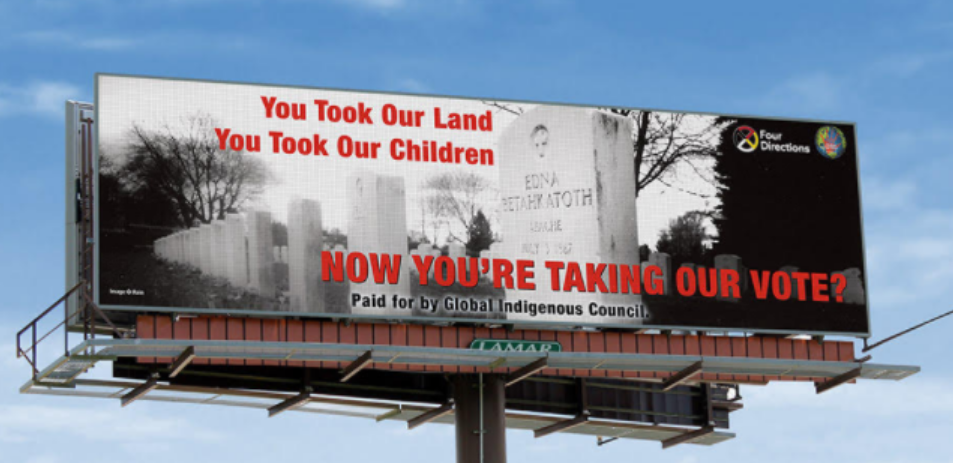
- Details
- By Native News Online Staff
PHOENIX — With efforts underway in over 40 state legislatures across the United States to suppress the vote of people of color, two Native American voter advocacy organizations, Four Directions and the Global Indigenous Council, launched on Thursday an educational campaign to support federal legislation that seeks to protect the Native vote.
“Native Americans have never had equality at the ballot box and the actions taken now are a perfect example of why,” said OJ Semans (Lakota), a co-founder of Four Directions, a nonpartisan organization that took a leading role in Native American voter registration and turnout effort.
The two groups announced on Thursday the placement of their first two billboards in the Phoenix area at I-10 between Guadalupe and Elliot, and Route 202 near the Route 101 loop. The billboards carry a powerful message — “You took away our land. You took away our children. Now you’re taking our vote?” — overlaid on an image of the children’s graveyard at the Carlisle Indian Industrial School in Pennsylvania.
The U.S. government forced Native American children into boarding schools, leaving their families at young ages, and erasing their indigenous cultures, languages, tribal names, religious and spiritual beliefs. Hundreds of children died at Carlisle, never to return to their families.
“First, they took away our land, our water and our food. Then they took away our children, and now they want to take away our vote,” Tom Rodgers (Blackfeet Nation), president of the Global Indigenous Council said in a press release. The Global Indigenous Council backed the work of Four Directions in Arizona and led separate successful Native American voter drives last year in Georgia and Montana.
“We have worked too hard and for too long to register and turn out Native American voters to allow states to impose racist laws created to suppress our votes,” Rodgers continued.
The groups chose Arizona to kick off their campaign where some of the most destructive voter suppression bills have been proposed in the Arizona State Legislature.
Included in the Arizona legislation is a provision to disallow the use of tribal cards as a form of identification.
The groups feel the Arizona bill targets Native voters because of the strong showing during the 2020 presidential election. In Arizona precincts on the Navajo and Hopi reservations, 60,000 ballots were cast versus less than 45,000 votes in the 2016 presidential election.
President Biden won Arizona with a 10,457 margin.
The Native vote arguably flipped Arizona for Biden. The numbers show the strength of the Native vote in Arizona was substantial. Election results in the three counties in northeast Arizona that overlap with the Navajo Nation and Hopi Tribe, showed that tribal citizens in precincts voted for Joe Biden over Donald Trump.
Down at the southern border in Arizona, the Tohono O’odham Nation out for Biden where voters cast 98 percent of their votes for the Biden-Harris ticket.
In coming weeks, the Native American voter advocacy campaign will include a comprehensive multi-media outreach and education effort targeting Indigenous Americans and the ever-increasing ranks of non-Natives allied with Indigenous Americans. Direct outreach to tribes, nations, villages and Native American leadership and membership organizations is already underway and will be supported by traditional media outreach, advertising, and social media.
“The message in our Native-to-Native outreach is simple: everything you care about, the land, the water, our brothers the wolf and grizzly bear, our languages, culture and self-empowerment is at stake,” Rodgers said. “There are dark forces at work here that want to take it all away and can do so wholesale by preventing Native Americans from having their say at the ballot box.”
The campaign to protect and preserve Native American enfranchisement coincides with other efforts by organizations that support the voting rights of Blacks, Hispanics, and young voters, all of which are groups targeted in voter suppression bills.
More Stories Like This
Native News Weekly (August 25, 2024): D.C. BriefsUS Presidents in Their Own Words Concerning American Indians
Two Murdered on Colville Indian Reservation
NDAA passes House; Lumbee Fairness Act Advances
NFL, Vikings to Host Native All-American Game, Youth Flag Clinic
Help us defend tribal sovereignty.
At Native News Online, our mission is rooted in telling the stories that strengthen sovereignty and uplift Indigenous voices — not just at year’s end, but every single day.
Because of your generosity last year, we were able to keep our reporters on the ground in tribal communities, at national gatherings and in the halls of Congress — covering the issues that matter most to Indian Country: sovereignty, culture, education, health and economic opportunity.
That support sustained us through a tough year in 2025. Now, as we look to the year ahead, we need your help right now to ensure warrior journalism remains strong — reporting that defends tribal sovereignty, amplifies Native truth, and holds power accountable.
 The stakes couldn't be higher. Your support keeps Native voices heard, Native stories told and Native sovereignty defended.
The stakes couldn't be higher. Your support keeps Native voices heard, Native stories told and Native sovereignty defended.
Stand with Warrior Journalism today.
Levi Rickert (Potawatomi), Editor & Publisher

